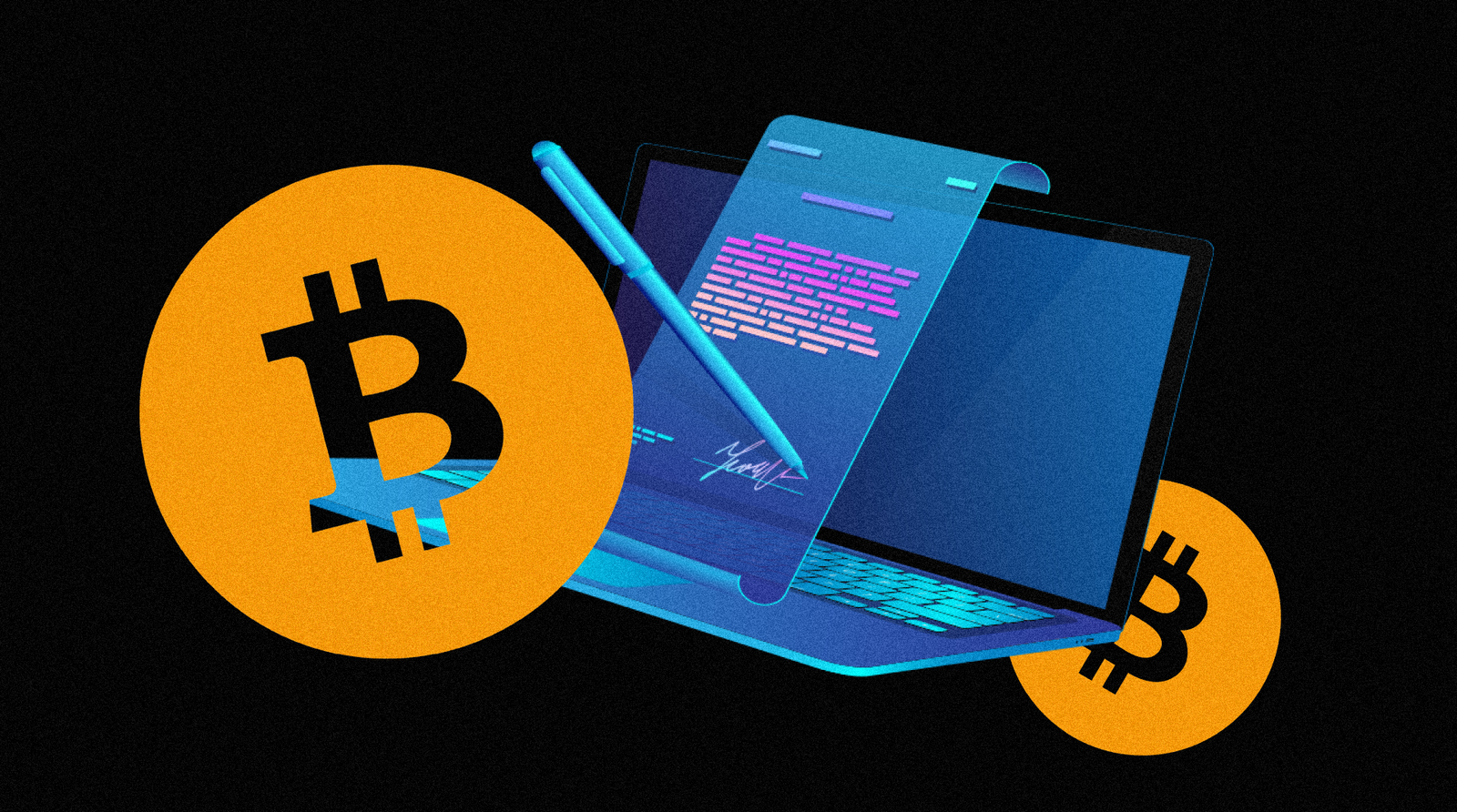The world of bitcoin smart contracts news has been buzzing with groundbreaking developments throughout 2025, marking a pivotal year for Bitcoin’s evolution beyond simple peer-to-peer transactions. While Bitcoin was originally designed as a digital currency, recent innovations are transforming it into a platform capable of executing complex smart contracts without compromising its core security principles.
From Arch Labs securing $13 million in funding for Bitcoin-native smart contracts to the revolutionary BitVM framework enabling Turing-complete computations, the landscape is rapidly evolving. These developments represent more than just technological upgrades—they’re reshaping how we perceive Bitcoin’s potential in the decentralized finance ecosystem and challenging the traditional dominance of Ethereum in smart contract functionality.
What Are Bitcoin Smart Contracts and Why Do They Matter
Bitcoin smart contracts represent a fundamental shift in how the world’s first cryptocurrency can be utilized. Unlike traditional Bitcoin transactions that simply transfer value from one address to another, smart contracts are self-executing agreements with terms directly written into code. These contracts automatically execute when predetermined conditions are met, eliminating the need for intermediaries and reducing counterparty risk.
The significance of bitcoin smart contracts extends far beyond technical innovation. They enable Bitcoin to compete directly with platforms like Ethereum in the decentralized application space while maintaining Bitcoin’s superior security model and network effects. This development is particularly crucial as it allows Bitcoin holders to participate in decentralized finance (DeFi) protocols without converting their BTC to other cryptocurrencies.
Traditional Bitcoin Script, the native programming language of Bitcoin, has limited capabilities compared to more advanced smart contract platforms. However, recent technological breakthroughs are changing this narrative, allowing developers to build sophisticated applications while preserving Bitcoin’s core principles of decentralization and security.
Latest Bitcoin Smart Contracts News Major Funding and Development Updates
Arch Labs Secures $13 Million for Bitcoin Native Smart Contracts
One of the most significant pieces of bitcoin smart contracts news in 2025 came with Arch Labs raising $13 million in funding toward building “ArchVM,” which could provide smart-contract functionality on Bitcoin. This substantial investment demonstrates institutional confidence in Bitcoin’s smart contract future and represents a major step toward making Bitcoin-native smart contracts a reality.
The ArchVM project aims to create a virtual machine specifically designed for Bitcoin, enabling developers to deploy complex smart contracts directly on the Bitcoin network. This development is particularly noteworthy because it focuses on native Bitcoin functionality rather than layer-2 solutions or sidechains, potentially making smart contracts an integral part of the Bitcoin ecosystem.
Bitcoin Swift’s AI-Enabled Smart Contract Innovation
Another significant development in recent bitcoin smart contracts news involves Bitcoin Swift’s ambitious roadmap. Bitcoin Swift’s 2025-2026 roadmap includes the Q1 launch of its full AI smart contract engine and federated oracle system, followed by the release of shielded DeFi modules in Q2. This project represents the convergence of artificial intelligence and blockchain technology, potentially creating more sophisticated and adaptive smart contract systems.
The integration of AI capabilities into Bitcoin smart contracts could revolutionize how these contracts operate, making them more responsive to market conditions and capable of handling complex decision-making processes that were previously impossible with traditional smart contract logic.
BitVM The Revolutionary Framework Transforming Bitcoin Smart Contracts

Understanding BitVM Technology
BitVM (Bitcoin Virtual Machine) stands as perhaps the most revolutionary development in bitcoin smart contracts news. BitVM enables more enhanced smart contract functionality by running computations off-chain. Instead of executing computations directly on Bitcoin, BitVM verifies them in a manner akin to optimistic rollups, utilizing fraud proofs, a challenge-response protocol and Bitcoin’s Taproot upgrade.
This approach is fundamentally different from how smart contracts work on platforms like Ethereum. Rather than executing all computations on-chain, which would require significant changes to Bitcoin’s consensus mechanism, BitVM performs computations off-chain and then verifies the results on the Bitcoin blockchain. This maintains Bitcoin’s efficiency while enabling complex smart contract functionality.
BitVM’s Turing Completeness Achievement
The most remarkable aspect of BitVM is its ability to achieve Turing completeness without modifying Bitcoin’s core protocol. The goal of BitVM is to enable Turing-complete Bitcoin contracts without making the network more complicated for other users. Turing completeness is a computing term for a system that can compute any possible calculation or program.
This breakthrough means that theoretically, any computation that can be performed on a computer can be verified on Bitcoin through BitVM. This opens up possibilities for complex decentralized applications, sophisticated financial instruments, and advanced smart contract logic that were previously impossible on Bitcoin.
BitVMX The Next Evolution
Building upon the original BitVM concept, BitVMX represents the next evolution in Bitcoin smart contract technology. BitVMX is a novel framework that extends Bitcoin’s capabilities by enabling complex smart contracts to run off-chain and settle on-chain without modifying the Bitcoin protocol itself. This upgrade promises to make Bitcoin smart contracts more accessible and practical for everyday use.
Mining Hash Power Supporting Bitcoin Smart Contract Development
Bitlayer’s Significant Hash Rate Commitment
One of the most encouraging developments in bitcoin smart contracts news involves major mining pools supporting these innovations. Bitlayer secures 31.5% of Bitcoin’s hashrate to bring smart contracts to BTC. This level of mining support is crucial for the success and security of Bitcoin smart contract implementations.
The backing of significant hash power demonstrates that the Bitcoin mining community sees value in smart contract functionality and is willing to support infrastructure that enables these capabilities. This mining support is essential for maintaining the security and integrity of any smart contract system built on Bitcoin.
The Bridge Between Bitcoin and DeFi
Recent developments have also focused on creating seamless bridges between Bitcoin and decentralized finance protocols. The bridge uses a smart contract to lock BTC, ensuring security through a system that allows honest participants to expose fraudulent activities. Central to the bridge is the YBTC token, pegged 1:1 with BTC, which enables BTC holders to engage in DeFi activities.
These bridging solutions are crucial for Bitcoin holders who want to participate in DeFi protocols without selling their BTC holdings. They represent a significant step toward making Bitcoin a more versatile asset in the broader cryptocurrency ecosystem.
Technical Infrastructure and Layer-2 Solutions
Lightning Network Integration
The Lightning Network, Bitcoin’s most successful layer-2 solution, plays a crucial role in the smart contract ecosystem. The Lightning Network is a Layer 2 protocol that runs on the Bitcoin blockchain. With the Lightning Network, nodes can open a channel between parties, enabling instant, low-cost transactions that can incorporate smart contract functionality.
Lightning Network channels themselves are a form of smart contract, demonstrating that Bitcoin has always had some smart contract capabilities. The network’s success provides a foundation for more advanced smart contract implementations and shows how layer-2 solutions can extend Bitcoin’s functionality without compromising its core principles.
Taproot’s Role in Smart Contract Evolution
The Taproot upgrade, implemented in 2021, laid important groundwork for current smart contract developments. Taproot in 2021 expanded Script with Schnorr signatures and key‑path spends, giving the network its first taste of complex smart‑contract logic. This upgrade improved privacy, efficiency, and flexibility for Bitcoin transactions while enabling more sophisticated smart contract implementations. Taproot’s Schnorr signatures and Merkle trees provide the cryptographic foundation that makes many current smart contract innovations possible, including the verification mechanisms used by BitVM and similar systems.
Real-World Applications and Use Cases
Decentralized Finance Integration
Bitcoin smart contracts are opening new possibilities for decentralized finance applications built directly on Bitcoin. These applications can leverage Bitcoin’s security and liquidity while providing advanced financial services previously only available on other blockchains.
The development of Bitcoin-native DeFi protocols could significantly impact the broader cryptocurrency ecosystem by allowing Bitcoin’s massive market capitalization to be utilized in decentralized finance applications. This could lead to more robust and secure DeFi protocols backed by the world’s most secure blockchain.
Cross-Chain Compatibility
Smart contract functionality on Bitcoin also enables better interoperability with other blockchain networks. Developers can create contracts that facilitate secure, trustless exchanges between Bitcoin and other cryptocurrencies without relying on centralized exchanges or custodial services.
This cross-chain functionality is particularly valuable for users who want to maintain exposure to Bitcoin while participating in applications on other blockchain networks. Smart contracts can facilitate these interactions while maintaining the security guarantees that Bitcoin users expect.
Enterprise and Institutional Applications
The emergence of bitcoin smart contracts is also attracting attention from enterprise and institutional users who value Bitcoin’s security and regulatory clarity but need more advanced functionality for their applications. Smart contracts on Bitcoin could enable sophisticated financial instruments, supply chain tracking systems, and other enterprise applications that require the highest levels of security and immutability that only Bitcoin can provide.
Challenges and Considerations
Scalability Concerns
While bitcoin smart contracts offer exciting possibilities, they also face scalability challenges. Bitcoin’s limited transaction throughput means that complex smart contract applications must be designed carefully to avoid network congestion and high fees. Most solutions address this challenge by moving computation off-chain while maintaining Bitcoin’s security guarantees for settlement. This approach requires careful design to ensure that the security benefits of Bitcoin are not compromised by the off-chain components.
Development Complexity
Creating smart contracts on Bitcoin is generally more complex than on platforms specifically designed for this purpose. Developers must work within Bitcoin’s constraints while achieving the functionality required by their applications. However, this complexity also brings benefits. Applications built on Bitcoin inherit its superior security model and benefit from the network effects of the world’s largest and most secure blockchain network.
Regulatory Implications
The development of smart contract functionality on Bitcoin also raises regulatory questions. As Bitcoin becomes capable of more complex applications, it may face increased regulatory scrutiny similar to other smart contract platforms. However, Bitcoin’s established regulatory status in many jurisdictions could provide advantages for smart contract applications built on Bitcoin compared to newer blockchain platforms that face regulatory uncertainty.
Future Outlook and Predictions
2025-2026 Development Timeline
Based on current development roadmaps and funding announcements, 2025 and 2026 are expected to be pivotal years for Bitcoin smart contracts. Multiple projects are planning mainnet launches, and the infrastructure supporting these applications continues to mature. The success of these early implementations will likely determine the pace of future development and adoption of Bitcoin smart contracts across the broader cryptocurrency ecosystem.
Market Impact Projections
The successful implementation of smart contracts on Bitcoin could significantly impact cryptocurrency markets by increasing Bitcoin’s utility and potentially attracting new users and applications to the Bitcoin ecosystem. This increased utility could also affect Bitcoin’s price dynamics and its relationship with other smart contract platforms like Ethereum, potentially changing the competitive landscape of blockchain applications.
Technology Integration Trends
Future developments are likely to focus on making Bitcoin smart contracts more accessible to developers through improved tooling, better documentation, and standardized development frameworks. Integration with existing Bitcoin infrastructure, including wallets, exchanges, and payment processors, will be crucial for mainstream adoption of Bitcoin smart contract applications.
Investment and Development Opportunities

Funding Landscape
The significant funding raised by projects like Arch Labs demonstrates strong investor interest in Bitcoin smart contract development. This funding trend is likely to continue as more projects demonstrate viable applications and technical progress. Investors are particularly interested in projects that can leverage Bitcoin’s security and network effects while providing new functionality that expands Bitcoin’s addressable market.
Developer Ecosystem Growth
The growing number of developers working on Bitcoin smart contracts is creating a virtuous cycle of innovation and improvement. Developer tools, educational resources, and community support are all improving rapidly. This ecosystem growth is essential for the long-term success of Bitcoin smart contracts and will determine how quickly new applications can be developed and deployed.
Partnership and Collaboration Trends
Successful Bitcoin smart contract projects are increasingly focusing on partnerships with existing Bitcoin businesses, mining pools, and infrastructure providers to ensure robust support and adoption. These partnerships help bridge the gap between experimental technology and practical applications that can be used by mainstream Bitcoin users.
Security and Technical Considerations
Maintaining Bitcoin’s Security Model
One of the primary challenges in implementing smart contracts on Bitcoin is maintaining the security properties that make Bitcoin valuable. All successful implementations must preserve Bitcoin’s decentralization, immutability, and resistance to censorship. The most promising approaches achieve this by using Bitcoin for final settlement while performing complex computations off-chain in a verifiable manner. This maintains Bitcoin’s security guarantees while enabling advanced functionality.
Fraud Prevention and Verification
Bitcoin smart contract systems incorporate sophisticated fraud prevention mechanisms that allow honest participants to challenge incorrect computations. These systems rely on economic incentives and cryptographic proofs to ensure that smart contracts execute correctly. The verification mechanisms used by systems like BitVM are designed to make fraud economically irrational while keeping the computational burden on the Bitcoin network minimal.
Privacy and Confidentiality
Advanced Bitcoin smart contract implementations also incorporate privacy features that protect user data and transaction details while maintaining the transparency needed for verification and security. These privacy features are particularly important for enterprise and institutional applications that require confidentiality while benefiting from Bitcoin’s security and immutability.
Also Read: Bitcoin 2025 Market Trends Regulation Mining and Institutional
Conclusion
The landscape of bitcoin smart contracts news in 2025 reveals a technology ecosystem on the brink of transformation. From Arch Labs’ significant funding milestone to the revolutionary potential of BitVM and its evolution into BitVMX, Bitcoin is rapidly evolving beyond its original conception as a simple digital currency. The support from major mining pools, innovative AI integration projects like Bitcoin Swift, and the development of sophisticated bridging solutions all point to a future where Bitcoin serves as the foundation for complex decentralized applications.
These developments represent more than just technological progress—they signify Bitcoin’s evolution into a comprehensive blockchain platform capable of competing with purpose-built smart contract networks while maintaining its unparalleled security and decentralization. As we continue to monitor bitcoin smart contracts news throughout 2025 and beyond, it’s clear that we’re witnessing the beginning of a new era for the world’s first cryptocurrency. For investors, developers, and Bitcoin enthusiasts looking to stay ahead of these transformative changes, following the latest bitcoin smart contracts news and understanding these technological developments will be crucial for navigating the evolving cryptocurrency landscape.

